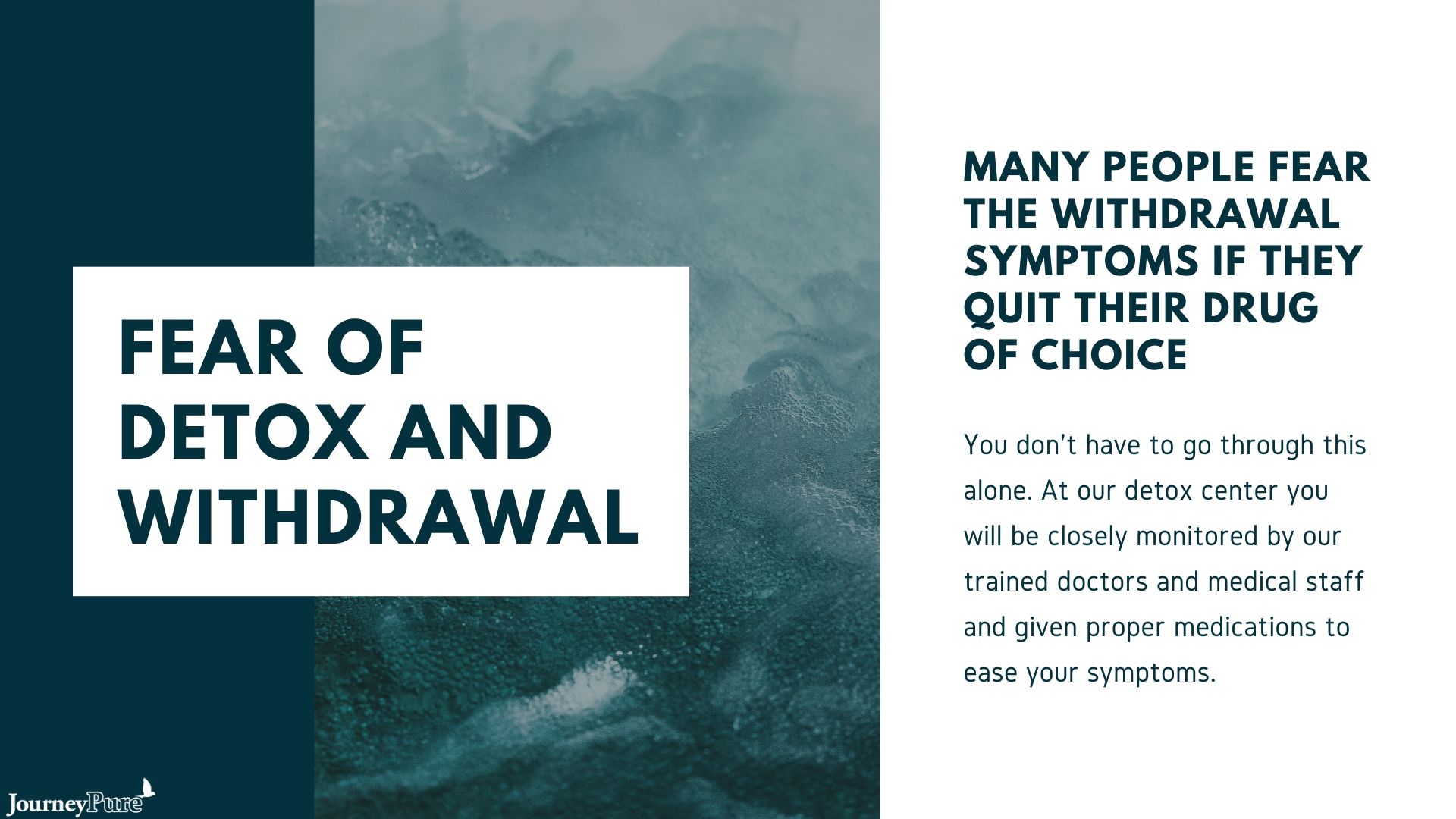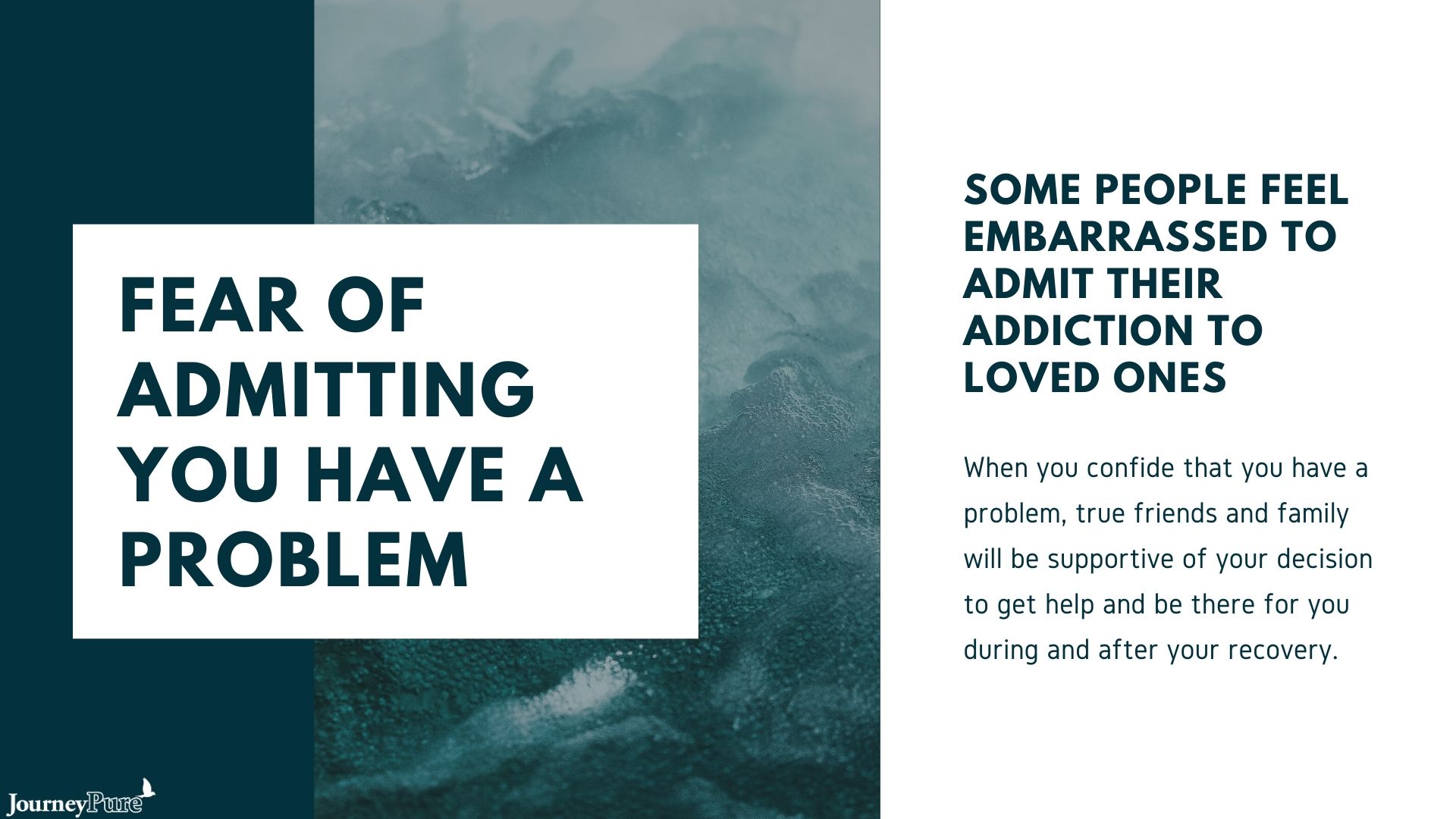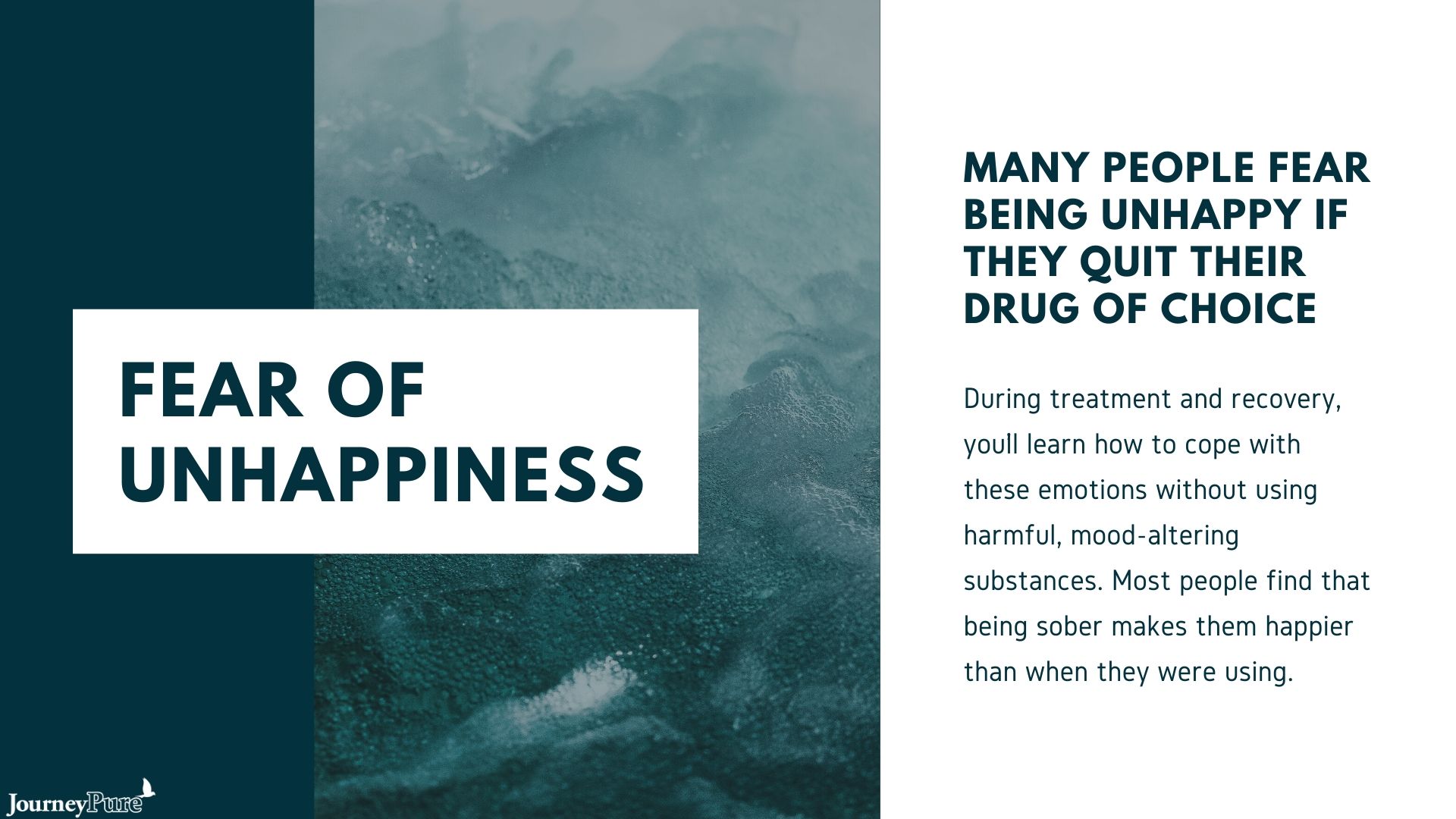Making the decision to enter a treatment facility to get help with an addiction is certainly not easy. There are many common fears of entering rehab that come up when contemplating this decision. The good news is, you’re not alone in feeling this way, and there are steps you can take that will help you get on your way to overcoming common rehab fears.
Here’s a list of the most common fears many addicts face and things you can do to ease the apprehension.
1) Fear of Detox and Withdrawal Symptoms
A common fear of rehab that many people face is the fear of what withdrawal will feel like. This fear is often intensified if you’re going through detox for the first time and you’re unsure of what to expect. Everyone has seen the struggle of detox symptoms played out in movies and television shows. The pain and sickness these characters seem to experience while going through withdrawal is enough to make any person anxious of the process. However, each person goes through their own detox journey and no two experiences are alike.
What to Do:
While detox and withdrawal symptoms are unpleasant and often uncomfortable, you won’t have to go through this experience alone. At a professional treatment facility like JourneyPure, you will be closely monitored by our trained doctors and medical staff throughout your entire detoxification process. Our clinicians use many different detox protocols so that your detox will be safe and pain-free. Painful withdrawal symptoms simply are unnecessary when detoxing.
We’ll be there with you to help you make this essential first step toward recovery. Keep in mind that detoxification is a uniquely personal experience and something that’s necessary to go through to set yourself on the path to achieving a better and healthier life.

2) Fear of Failure
The fear of failing keeps a lot of people from moving forward in their lives, and this fear doesn’t apply to just people who are considering entering a treatment facility. Being afraid to fail at recovery is a big reason why many people who need help are afraid to get it. The idea of going through the process of getting sober only to relapse back into drugs and alcohol is common and realistic fear that you may have.
What to Do:
If you decide not to try because you’re afraid to fail, you’re not even giving yourself a chance from the start. You may surprise yourself and realize that going to a treatment facility was just the push you needed to get clean. And if you should happen to relapse, it’s okay as long as you learn from it and try again.
According to the National Institute on Drug Abuse, 40-60% of people with a drug addiction will relapse after treatment. This relapse rate is similar to the relapse rates of other medical conditions with physiological and behavioral components, such as asthma and hypertension. Both of these diseases have a 50-70% chance of relapse.
If you should relapse after treatment, it’s important to take the time to discover what made you relapse, and then find ways to avoid putting yourself into those same situations again. Just because you relapse doesn’t mean you or the treatment has failed — it simply means your treatment needs to be adjusted so you can be successful.
3) Fear of Success
Some people feel they don’t deserve to succeed. Maybe you’ve done things in the past that makes you feel like you need to punish yourself and stay unhappy forever, or maybe you’ve suffered from an abuser who told you that you don’t deserve happiness and you eventually started to believe it. People who have a fear of success will often self-sabotage in order to avoid it.
What to Do:
Try to be mindful of the present and allow yourself to feel the fear instead of running from it. Over time, the fear you have will start to subside. At JourneyPure, we will work with you to help ease these fears and find ways to overcome them. We will work with you through your recovery to not just treat the addiction, but also focus on reinforcing positive mental health and overcoming any trauma in your life that may have affected you.

4) Fear of Admitting You Have a Problem
Realizing you have a problem and coming to terms with the thought of your friends and family knowing about your addiction can be a big challenge. Some people feel embarrassed to admit this to loved ones, while others are simply in denial that anything is wrong. In order to successfully go through rehabilitation, you first have to admit and accept that there’s a problem.
What to Do:
Most of the time, your friends and family are already aware of your drug or alcohol problem and they will usually feel a sense of relief that you’re seeking help. If they’re not aware, true friends and family will be supportive of your decision to get help and be there for you during and after your recovery. Your loved ones will want the best for you, and living a healthy and clean life is at the top of the list.
5) Fear of Dealing With the Past
For many people who are contemplating entering a treatment facility for help with addiction, there are often things they’ve done in the past because of their addiction that may have strained or broken important relationships. The thought of facing these loved ones and trying to mend these relationships can sometimes seem impossible and overwhelming. You may have no idea where to begin and can even feel afraid of facing this person to start the process.
What to Do:
With the help of a treatment facility, therapy and support groups, you will learn how to confront this fear. Repairing broken relationships will not happen overnight. In fact, they can take a long time to heal. At JourneyPure, we can help you to facilitate the start of mending a relationship in an environment where both parties feel safe and unthreatened.
It’s important to involve your family in your recovery process, so both you and your family can begin to heal together. From there, you’ll learn the tools to continue to foster these relationships outside of treatment and beyond.
6) Fear That People Won’t Like Me
If you have a drug or alcohol problem, it’s likely that the people you hang out with will, too. If your friends aren’t ready to give up a toxic lifestyle, it can be scary to think that they won’t approve of your new, sober life. Who will you hang out with after recovery? What if my friends are mad at me for changing? These are valid questions that may come up before deciding to make a change in the lifestyle you live.
What to Do:
The fear of being not liked by others is a common anxiety that many people experience when they’re entering a new and unfamiliar situation. This fear doesn’t just apply to those who are entering or leaving a treatment center, as this is something that almost everyone will experience at some point in their lives.
If you’re looking to move forward from an addiction, now is the time to honestly evaluate your existing relationships. By taking a deep look into your relationships, you can determine if they’re truly healthy or unhealthy for you. Just remember: if your friends aren’t supportive of your choice to lead a healthy lifestyle, they may not be the type of friends you can really count in your life.
Of course, this thought can be saddening, but keep in mind that along the way you’ll meet people in your treatment facility and support groups who you’ll have things in common with. You’ll have the opportunity to create new bonds with people who have similar life circumstances and interests. Eventually, you might find that it may be time to let go of some of the old relationships that are leading you down an unhealthy path to make room for new, healthier relationships.
7) Fear of Handling Stress
Stress can be a major trigger that causes some people to engage in harmful behaviors. Extreme stress can even amplify these behaviors and make them worse than ever before. If turning to drugs or alcohol to handle stress has been your coping method, you’re likely fearful of how you’re going to handle stress without them.
What to Do:
During your time spent in treatment, you’ll learn ways to cope with stressors that don’t involve the use of alcohol, drugs or other destructive behaviors. There will be many things throughout your life that will cause you stress, and knowing how to deal with it in a healthy way instead of turning to alcohol or drugs will set you up for a lifetime of success.
Stress management is a critical focus in treatment centers, and you’ll learn how to replace destructive behaviors with more positive ones.
Fear of Finding a New Identity
For years you’ve self-identified as an addict or alcoholic. Without these things, you may have no idea who you are or what else you can be. It can be frightening, when that identity is taken away, to no longer know who you are.
What to Do:
Keep in mind that not knowing who you are without drugs or alcohol is only temporary. During treatment and recovery is the time to get out of your comfort zone and try new things. There’s a whole world of possibilities that you might find interest you. Lean on people from support groups or sober friends and family members to create new experiences with you.
Or, if you prefer going solo, experiment with new interests on your own. You have a rare opportunity to create a whole new life for yourself. Who knows? You may just even find that discovering your new identity is exciting!

9) Fear of Unhappiness
No one wants to be unhappy. The fear of being unhappy is similar to the fear of failure, where both can paralyze you so you stay stuck in your current situation. At least here you know what to expect. It’s understandable to be concerned that you’ll be unhappy once you’re sober. After all, you were likely using drugs and alcohol to hide from the sadness and unhappiness you were feeling in the past.
What to Do:
During treatment and recovery, you’ll learn how to cope with these emotions without using harmful, mood-altering substances. Change takes time, and expecting to be blissful and sober overnight is unrealistic.
We will work with you to make sure mental happiness is achievable for you, and that you’re setting realistic expectations for yourself in your recovery. All people feel a range of emotions throughout their life, and now you’ll learn to deal with these emotions in positive ways. Both physical and emotional recovery takes time and effort, but in the end, when you’re able to live a confident lifestyle, it will all be worth it.
10) Fear of No Longer Having Fun
If fun was associated with drugs and alcohol for you, then you may be wondering how you’re going to have fun while sober. Many people who use drugs or alcohol use them in social settings as ways to let loose or party with friends. If this has become your day-to-day way to escape and have fun, it can certainly be frightening to think that there will be no more fun times ahead.
What to Do:
There likely was a time in your life when you didn’t use drugs, alcohol or other destructive behaviors to let loose and have fun. So don’t worry — the fun times will certainly come again! Take some time to find a new definition of fun for yourself.
Maybe you’ll find you enjoy quietly reading a book in the park, going for hikes in the woods, playing a sport with friends or training to compete in a 5k. The possibilities are endless, but it might take a little trial and error to find what you enjoy doing. And likely when you do find a hobby or something that interests you, you’ll meet other people who enjoy doing these same things. This will also open you up to creating new and healthy friendships. So don’t be afraid to try a few new things to find what you call fun!
Contact JourneyPure for Help
If you or someone you know is struggling with addiction, JourneyPure is here to help. We realize that everyone’s journey is different. That’s why we create an individualized treatment plan for each person that enters our facility. We take the time to work with you and your family to address your individual needs. There are no one-size-fits-all programs here!
We also realize that there are many fears associated with addiction recovery, and we’re here to help. Contact us today and we can help you overcome the fear of rehab so you can get started on your own journey to recovery.
From the JourneyPure team where we get to explore a wide variety of substance abuse- and mental health-related topics. With years of experience working alongside those suffering from substance abuse and mental health issues, we bring important messages with unparalleled knowledge of addiction, mental health problems, and the issues they cause.

